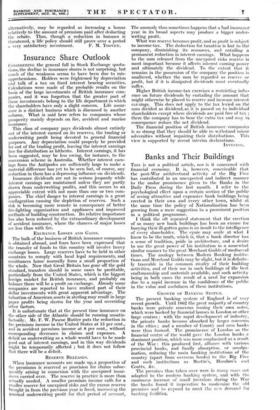RESERVE RELEASES.
When insurance accounts are made up, a proportion of the premiums is reserved as provision for claims subse- quently arising in eonnekion With the unexpired insur- ances carried over. The reserve in practice is more than actually needed. A smaller premium income calls for a smaller reserve for unexpired risks and the excess reserve brought in from the previous year is freed, increasing the nominal underwriting profit for that period of account. The anomaly thus sometimes happens that a bad insurance year in its broad aspects may produce a bigger under- writing profit.
What was reserve becomes profit, and as profit is subjeot to income-tax. The deduction for taxation is lost to 00 company, diminishing its resources, and entailing ,a permanent reduction in interest earnings. What happens to the sum released from the unexpired risks reserve ig most important. because it affects interest earning power and ultimately the dividend. To the extent that it remains in the possession of the company the position is unaltered, .whether the sum be regarded as reserve or profit, but if it is dissipated dividends must eventually suffer.
Higher British income-tax exercises a restricting influ- ence on future dividends by curtailing the amount that might otherwise be placed to reserve and increase interest earnings. This does not apply to the tax levied on the sum divided as dividend, as it is passed on to individual shareholders except where dividends are paid free of tax ; there the company has to bear the extra tax and may in consequence reduce the net dividend.
The financial position of British insurance companies is so strong that they should be able to withstand minor adversities without impairing their distributions. This view is supported by recent interim declarations. _
INVESTOR.






































 Previous page
Previous page